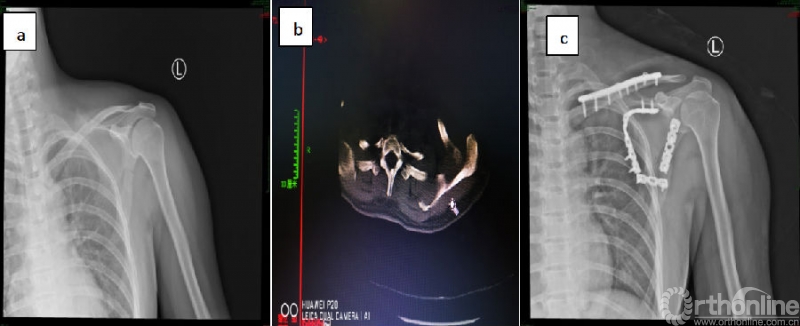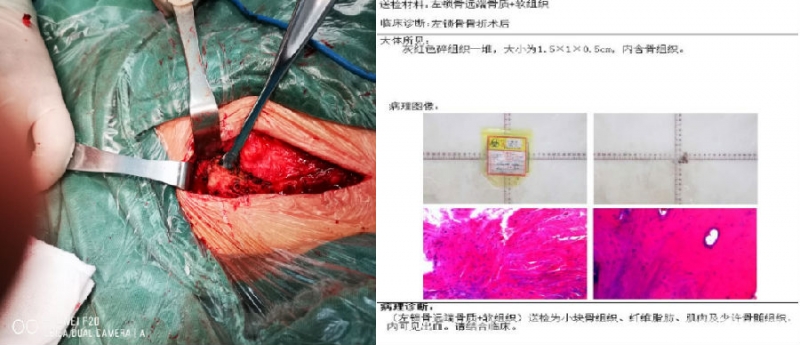来源:三门峡市中心医院
作者: 陈皓
一、病例资料
患者37岁,女性,2018年12月12日车祸致左锁骨及左肩胛骨折,在三门峡市中心医院行左锁骨及左肩骨骨折手术治疗,术后半年复查X线片提示左锁骨远端骨溶解,术后两年在三门峡市中心医院行内固定取出并取病理检查。(附随诊相关影像学资料及病理资料)
术前术后影像学资料

注:图a为术前X线片(2018.12.12),可见锁骨及肩胛骨骨折;图b为术前CT轴位肩锁关节平面(2018.12.12),可见肩锁关节脱位;图c为术后X线片(2018.12.29),左锁骨及左肩胛骨固定术后。
术后复查影像学资料

注:图d为2019.06.18复查的X线片,提示左锁骨远端溶解;图e、f、g为2020.11.30复查的X线、CT、MRI,提示左锁骨远端缺失,核磁压脂像上未见明显的混杂信号。
术中及术后病理资料

注:术中可见锁骨溶骨端比较锋利,术后病检回报提示考虑简单骨溶解。
二、讨论
创伤后锁骨骨溶解(post-tramautic osteolysis of the distal clavicle)是一种罕见病,通过知网万方医学等中文数据库检索,仅有陶惠民[1]、邱乾德[2]等少数学者撰写的相关报道;检索外文文库Pubmed,相关报道相对较多。创伤后锁骨骨溶解首次报道在1936[3]年,至20世纪末,据文献记载相关报道仅100例[4]左右。
创伤后锁骨骨溶解,因为其罕见性,到目前为止其确切的病理发病机制尚不明确[5];但回顾历史文献记载,其好发于两者人群。
第一,急性创伤人群,1936[3]年首次报道的锁骨骨溶解,其认为这种疾病的发生仅仅与肩锁关节脱位或半脱位有有关,本文记述的个例出现肩锁关节脱位,后来的文献报道肩锁关节脱位的患者中发生创伤后锁骨骨溶解的概率为1%-21%[6-9];随后的报道中,锁骨远端骨溶解好发的第二种人群逐步报道出来,以高强度上肢运动为主的人群中,1959年首次报道在一位没有外伤史的便携式气钻操作员身上,认为肩部反复的局部应力是导致锁骨远端溶解的原因[10-12];随后,大量上肢为主的体育竞技运动员出现该现象,包括手球、棒球、举重等竞技运动[5]。总之,目前公认急性创伤和反复的局部应力是导致锁骨远端骨溶解的两种原因,病理机制尚待研究。
创伤后锁骨骨溶解其疾病特点在骨溶解阶段是多样的,主要包括疼痛,特别是外展上臂160-180°时,疼痛明显、力量减弱[3];影像学表现上,早期症状轻微,很难发现其病变,随着疾病进展,核磁可表现肩锁关节的水肿信号,再进展X线出现骨质的受累;相关文献报道,急性创伤后2-4周可逐步出现骨溶解,或是在反复局部应力后的数月至数年出现[13]。
锁骨远端骨溶解,其临床症状(疼痛、活动受限、肌力减弱),一般为自限性[3],数月内会缓解;针对其治疗,首选冰敷、吊带固定、口服阵痛药及制动等相关治疗[5];其次,可口服消炎阵痛药及局部注射类固醇激素,可取得有限的疗效[10、14];保守治疗无效,可选取手术切除治疗,手术切除可以缓解疼痛,不影响肩关节继续活动,但其破坏肩关节的结构,可能导致肩关节异常活动[15-17]。
创伤后锁骨远端骨溶解,发病率罕见,其病理机制尚未明确,好发急性外伤人群和反复肩部受力的人群,临床症状一般为自限性,可采取冰敷、制动、激素局部封闭等保守治疗,效果不佳可采取手术切除。
参考文献:
[1]陶惠民.季滢瑶.陈维善.杨迪生. 创伤后骨溶解症[J]. 中华骨科杂志, 2007(07).
[2]邱乾德.许加峻.林达.刘绪明. 创伤后骨质溶解症X线图像特征[J]. 中华放射学杂志, 2009(11).
[3]P. Reber " A. G.Dupas J, Badelon P. Aspects radiologiques d’une ostéolyse essentielle progressive de la main gauche. J Rodiol d’atctrol. 1936;20:383
[4] Patel • R. Hess - B. Noesberger. Post-traumatic osteolysis of the distal clavicle[J]. Arch Orthop Trauma Surg, 1996(122).
[5]Mestan M A, DC, Bassano A A J M, etal. Posttraumatic Osteolysis of the Distal Clavicle: Analysis of 7 Cases and a Review of the Literature[J]. Journal of Manipulative and Physiological Therapeutics, 2001, 24(5):356-361.
[6]Patten RM. Atraumatic osteolysis of the distal clavicle: MR findings. J Comput Assist Tomogr 1995; 19:92- 95
[7]Bergfeld JA, Andrish JT, Clancy WG. Evaluation of the acromioclavicular joint following first-and second-degree sprains. Am J Sports Med 1978; 6:153-9.
[8]Eskola A, Vainionpaa S, Korkala S, Santavirta S, Gronblad M, Rokkanen P. Four-year outcome of operative treatment of acute acromioclavicular dislocation. J Orthop Trauma 1991; 5:9-13.
[9]Scavenius M, Iversen BF, Sturup J. Resection of the lateral end of the clavicle following osteolysis, with emphasis on non-traumatic osteolysis of the acromial end of the clavicle in athletes. Injury 1987; 18:261-3.
[10]Cahill B. Atraumatic osteolysis of the distal clavicle. Sports Med 1992;13:214-22.
[11]Scavenius M, Iversen B, Sturup J. Resection of the lateral end of the clavicle following osteolysis, with emphasis on nontraumatic osteolysis of the acromial end of the clavicle in athletes. Injury 1987;18:261-3
[12]Halaby F, Di Salvo E. Osteolysis: a complication of trauma. AJR Am J Roentgenol 1965;94:591-4.
[13]Yu, Joseph S.; Dardani, Marcella; Fischer, 等. MR Observations of Posttraumatic Osteolysis of the Distal Clavicle After Traumatic Separation of the Acromioclavicular Joint[J]. Journal of Computer Assisted Tomography, 2000, 24(1):159-164.
[14]Kaplan P, Resnick D. Stress-induced osteolysis of the clavicle. Radiology 1986;158:139-40.
[15]Auge W, Fischer R. Arthroscopic distal clavicle resection for isolated atraumatic osteolysis in weight lifters. Am J Sports Med 1998;26:189-92.
[16]. Eskola A, Santavirta S, Viljakka H, Wirta J, et al. The results of operative resection of the lateral end of the clavicle. J Bone Joint Surg Am 1996;78A:584-7.
[17]. Blazar P, Iannotti J, Williams G. Anteroposterior instability of the distal clavicle after distal clavicle resection. Clin Orthop 1998;348:114-20.